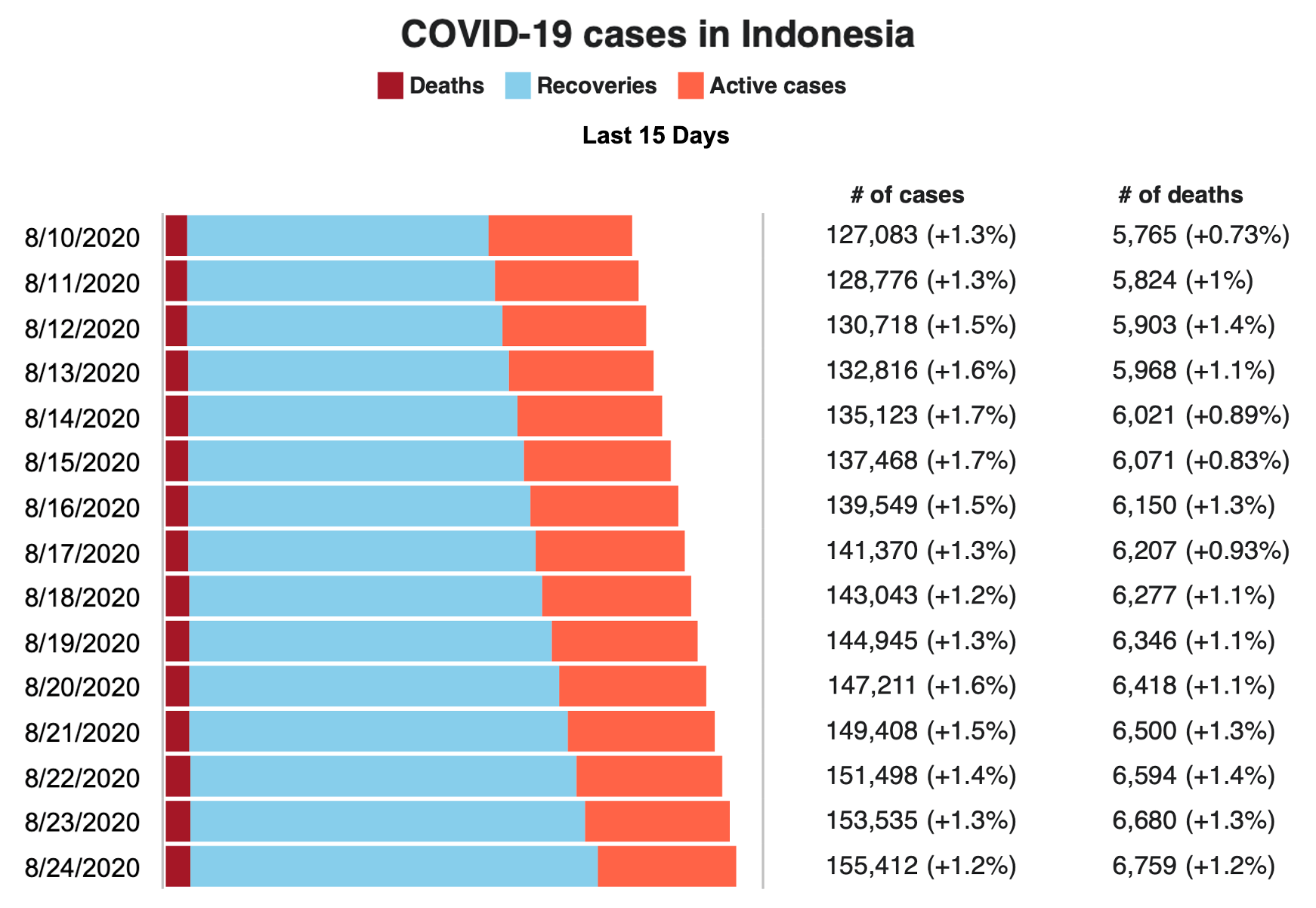Indonesia Corona Virus #26 August 24, 2020
Cumulative number of reported cases: 155,412 (as of August 24)
6759 Deaths
110,060 Recoveries
Rupiah to US$14,794
Jakarta Stock Exchange Index: 5,277

ion_builder_container]
ion_builder_container]
Overview-One Long Wave
The pandemic continues to spread to all 34 of Indonesia’s provinces with new cases (week-on-week) growing 9% nationally, a slight decline from last week. Active cases grew 2%. National PCR testing has a 15% positive rate with Jakarta accounting for close to 50% of all PCR tests. Hospitals appear to have sufficient capacity for COVID-cases, but this varies by province; nationwide the rate is 40% but in Papua it is 90%.
Indonesia may not have been as hard hit (lower death rates) as other countries but a key question is the accuracy of official statistics. And unlike other countries, the rate of infection is growing not abating. Some analysts are describing Indonesia not in terms of first and second waves but as one long one. A recent Reuters article had several ominous quotes: “This virus has already spread all over Indonesia. What we are doing is basically herd immunity,” said Prijo Sidipratomo, dean of the Faculty of Medicine at the National Veterans Development University in Jakarta. “Our concern is that we have not reached the peak yet, that the peak may come around October and may not finish this year,” said Iwan Ariawan, an epidemiologist from the University of Indonesia. “Right now we can’t say it is under control.”
Travel- Not Opening Until End of the Year
“The government is still prohibiting its citizens from traveling abroad at least until the end of 2020. In line with the policy, we also cannot open the gate to international travelers until the end of 2020 as the situation in Indonesia, including Bali, is not yet safe to welcome them,” said Bali Governor Wayan Koster in a statement Saturday. Koster noted that Australia, a major source of tourists, is currently banning its citizens from travelling overseas.
Economic
- BI Will Buy Bonds: BI Governor Perry Warjiyo said on Wednesday that the central bank would continue its role as a non-competitive bidder in government bond auctions next year, while assuring that it would have the capacity to do so. “We will only bid when the market is not capable of absorbing [the bonds]. We will have further discussion with the Finance Minister on the market capacity and the government funding strategy,” he said during a livestreamed press briefing.
- Omnibus Jobs Bill: This key piece of legislation, whose major feature is a modification of the very generous severance pay provisions of the current Labor Law, is currently the focus of a 16 member team of parliamentarians and labor representatives. Key leaders of political parties (Golkar, PDI-P) with large representation in Parliament announced this week that they expect September as the date for the bill’s passage. However, leaders of other parties (PPP, Nasdem) said no target date need be followed. Meanwhile, a labor group has challenged the bill in court.
2021 Budget: Key assumptions:
- GDP Growth: 4.5-5%
- Inflation: 3%
- Exchange Rate: 14,600 rupiah to US $
- Oil Price: $45 a barrel
- Lifting: 705,000 barrels a day
- Fiscal Deficit: 5.5% of GDP
President Jokowi outlined 4 main priorities for 2021:
- accelerate national recovery due to the COVID-19 pandemic
- promote structural reform to increase productivity, innovation, and economic competition
- accelerate economic transformation to the digital era
- anticipate and capitalize on demographic change.
- Big Losses at Pertamina: Indonesia’s largest oil and gas company, state-owned Pertamina, booked a US$767.92 million net loss in the first half of this year amid weak energy demand and prices.
- BI Intends to Force Rupiah Conversion on Natural Resource Exports: Bank Indonesia (BI) plans to require exporters of natural resources to convert their foreign exchange (forex) earnings into rupiah to stabilize the country’s currency. Exporters of natural resources that earned more than US$300 million from 2019 shipments will be required to convert their earnings to rupiah, BI Governor Perry Warjiyo said during a meeting with lawmakers on Monday, adding that the measure was aimed at shoring up the rupiah’s stability and bolstering Indonesia’s external stability. The effective date for the new regulations will depend on the stability of the rupiah, he said, adding that there would be a ceiling for the amount exporters kept in their bank accounts and anything above must be converted to rupiah.
Governance
President Jokowi used his annual Independence Day (August 17) national address as well as a speech on national finances to push his nation to use the pandemic crisis as an opportunity for “fundamental, structural reform”, and “expand quality employment opportunities”. His speech promoted his signature priorities: digital economy and inclusiveness, domestically-produced products, Pancasila (5 principles), equitable prosperity, regulatory and bureaucratic reform, environmentally-protective policies. The President said: “Our target is not just to free ourselves from the pandemic and exit the crisis. Our steps are to make a major leap forward…” (translation by Reformasi Weekly).





